Matt Rees's Blog, page 4
February 10, 2014
FREE ebook on Arafat murder for download this week
Download the truth behind the Palestinian leader's killing
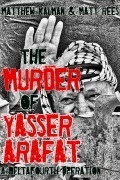 My ebook The Murder of Yasser Arafat is available for FREE download this week. Get the US edition or download the UK edition. Download it by Friday to get it free.
My ebook The Murder of Yasser Arafat is available for FREE download this week. Get the US edition or download the UK edition. Download it by Friday to get it free.
Written with Matthew Kalman, The Murder of Yasser Arafat reveals for the first time the true murderous story behind the death of the historic, controversial leader of the Palestinians. We uncover a plot that reached to Yasser Arafat’s inner circle. The Times of Israel calls it "racy and provocative." Le Parisien says it's "written with the style of crime novel."
If you enjoy your free ebook, I hope you'll pick up our other Middle East nonfiction ebook. It's called Psychobibi: Who Is Israel's Prime Minister and Why Does He Want to Fail? Here's what it's about:
Benjamin Netanyahu is locked in a deep psychological battle with the ghosts of his tough father and golden brother. The result: Bibi’s driven to succeed, so long as he can always get it wrong in the end. Confused? You won’t be. Not after you’ve met Psychobibi. Hard-hitting and irreverent, incisive and hardboiled. Get the US edition. Download the UK edition.
Related articles across the web
 Arafat poison stories show need for a new kind of journalism
Arafat poison stories show need for a new kind of journalism
 Palestinian official: Murderers of Yasser Arafat to be named
Palestinian official: Murderers of Yasser Arafat to be named
 Yasser Arafat: a farce in Ramallah
Yasser Arafat: a farce in Ramallah
 Scientists say Yasser Arafat was not poisoned
Scientists say Yasser Arafat was not poisoned
 My ebook The Murder of Yasser Arafat is available for FREE download this week. Get the US edition or download the UK edition. Download it by Friday to get it free.
My ebook The Murder of Yasser Arafat is available for FREE download this week. Get the US edition or download the UK edition. Download it by Friday to get it free.Written with Matthew Kalman, The Murder of Yasser Arafat reveals for the first time the true murderous story behind the death of the historic, controversial leader of the Palestinians. We uncover a plot that reached to Yasser Arafat’s inner circle. The Times of Israel calls it "racy and provocative." Le Parisien says it's "written with the style of crime novel."
If you enjoy your free ebook, I hope you'll pick up our other Middle East nonfiction ebook. It's called Psychobibi: Who Is Israel's Prime Minister and Why Does He Want to Fail? Here's what it's about:
Benjamin Netanyahu is locked in a deep psychological battle with the ghosts of his tough father and golden brother. The result: Bibi’s driven to succeed, so long as he can always get it wrong in the end. Confused? You won’t be. Not after you’ve met Psychobibi. Hard-hitting and irreverent, incisive and hardboiled. Get the US edition. Download the UK edition.
Related articles across the web
 Arafat poison stories show need for a new kind of journalism
Arafat poison stories show need for a new kind of journalism  Palestinian official: Murderers of Yasser Arafat to be named
Palestinian official: Murderers of Yasser Arafat to be named  Yasser Arafat: a farce in Ramallah
Yasser Arafat: a farce in Ramallah  Scientists say Yasser Arafat was not poisoned
Scientists say Yasser Arafat was not poisoned
Published on February 10, 2014 00:52
•
Tags:
arafat, free-books, free-ebook, middle-east, palestinians
February 6, 2014
Writing crime fiction: Don't use the magic hacker
The computer 'hacker' character undermines the credibility of many thrillers
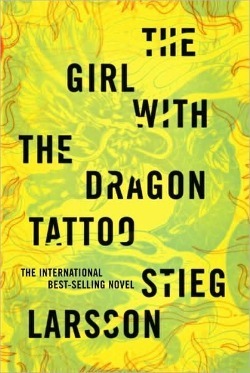 The use of a hacker character in Swedish writer Stieg Larsson's megaseller The Girl with the Dragon Tattoo
The use of a hacker character in Swedish writer Stieg Larsson's megaseller The Girl with the Dragon Tattoo made me want to throw knives like the Swedish Chef on The Muppet Show. To explain why, let's look at the role the "hacker" character has taken in recent crime fiction (and in movie thrillers.)
made me want to throw knives like the Swedish Chef on The Muppet Show. To explain why, let's look at the role the "hacker" character has taken in recent crime fiction (and in movie thrillers.)
In Dragon Tattoo the eponymous heroine is the now generic thriller/mystery character: the Internet hacker genius. Whenever Larsson needs to inject some new information or to unravel a tricky plot point, his hacker opens up her laptop and links into www.secretgovernmentinformation.gov, the well-known (to fiction writers) site where intelligence networks store material they want to be sure is available only to fictional hacker geniuses (and by proxy to thriller writers).
Hackers can do this kind of thing. But thriller writers don't take the time to learn enough about cybercrime to make the manner in which hackers operate credible. It all takes place by magic. Dragon Tattoo isn’t the worst offender on this score. Just the biggest seller.
Computers and hackers are a necessary part of today's criminal world and therefore of crime fiction. That's why I'm currently taking a course in cybercrime and cybersecurity. I want to be sure any computer crime in my novels is handled credibly. I've learned that any hacking you make up off the top of your head will be a lot less scary than what real hackers (whether individuals, crime syndicates, or governments) are up to.
If you don't believe me, watch this:
In my previous novels the only time the Internet comes up is in A Grave in Gaza when the granddaughter of my Palestinian sleuth Omar Yussef sets up a website for him in her attempt to make him seem more professional. The Palestine Agency for Detection, as she calls her site, is merely embarrassing to Omar. No plot-point-shifting Houdini act there.
I'm sensitive to this question of hackers in thrillers, because I've been living in the Middle East for almost two decades. How does that follow? Here's how:
The computer hacker has taken over from the Israeli Mossad as the thriller writer’s cure-all. In the old days, if there was something your main character couldn’t figure out, all he had to do was get in touch with the nearest Mossad agent, who’d be sure to know all the secrets in the world and was happy to pass them on with a few dark words about never forgetting the Holocaust and a cheerful “Shalom.”
As someone who presently lives in Israel, I can tell you the Mossad doesn’t operate that way. Neither does the Internet. So write credibly about the work of hackers and those who fight them. That'll make your work seem much less like that of a ... hack.
Related articles across the web
 The Girl With the Dragon Tattoo: new author signed up for fourth book
The Girl With the Dragon Tattoo: new author signed up for fourth book
 Sequel announced to Stieg Larsson's Girl With the Dragon Tattoo trilogy
Sequel announced to Stieg Larsson's Girl With the Dragon Tattoo trilogy
 New author to continue 'The Girl With The Dragon Tattoo' series
New author to continue 'The Girl With The Dragon Tattoo' series
 The use of a hacker character in Swedish writer Stieg Larsson's megaseller The Girl with the Dragon Tattoo
The use of a hacker character in Swedish writer Stieg Larsson's megaseller The Girl with the Dragon TattooIn Dragon Tattoo the eponymous heroine is the now generic thriller/mystery character: the Internet hacker genius. Whenever Larsson needs to inject some new information or to unravel a tricky plot point, his hacker opens up her laptop and links into www.secretgovernmentinformation.gov, the well-known (to fiction writers) site where intelligence networks store material they want to be sure is available only to fictional hacker geniuses (and by proxy to thriller writers).
Hackers can do this kind of thing. But thriller writers don't take the time to learn enough about cybercrime to make the manner in which hackers operate credible. It all takes place by magic. Dragon Tattoo isn’t the worst offender on this score. Just the biggest seller.
Computers and hackers are a necessary part of today's criminal world and therefore of crime fiction. That's why I'm currently taking a course in cybercrime and cybersecurity. I want to be sure any computer crime in my novels is handled credibly. I've learned that any hacking you make up off the top of your head will be a lot less scary than what real hackers (whether individuals, crime syndicates, or governments) are up to.
If you don't believe me, watch this:
In my previous novels the only time the Internet comes up is in A Grave in Gaza when the granddaughter of my Palestinian sleuth Omar Yussef sets up a website for him in her attempt to make him seem more professional. The Palestine Agency for Detection, as she calls her site, is merely embarrassing to Omar. No plot-point-shifting Houdini act there.
I'm sensitive to this question of hackers in thrillers, because I've been living in the Middle East for almost two decades. How does that follow? Here's how:
The computer hacker has taken over from the Israeli Mossad as the thriller writer’s cure-all. In the old days, if there was something your main character couldn’t figure out, all he had to do was get in touch with the nearest Mossad agent, who’d be sure to know all the secrets in the world and was happy to pass them on with a few dark words about never forgetting the Holocaust and a cheerful “Shalom.”
As someone who presently lives in Israel, I can tell you the Mossad doesn’t operate that way. Neither does the Internet. So write credibly about the work of hackers and those who fight them. That'll make your work seem much less like that of a ... hack.
Related articles across the web
 The Girl With the Dragon Tattoo: new author signed up for fourth book
The Girl With the Dragon Tattoo: new author signed up for fourth book  Sequel announced to Stieg Larsson's Girl With the Dragon Tattoo trilogy
Sequel announced to Stieg Larsson's Girl With the Dragon Tattoo trilogy  New author to continue 'The Girl With The Dragon Tattoo' series
New author to continue 'The Girl With The Dragon Tattoo' series
Published on February 06, 2014 04:11
•
Tags:
computer-hackers, crime-fiction, thrillers, writing, writing-tips
February 5, 2014
Writing crime fiction: Finding the writer to inspire your own creativity
Writers should study an author whose work sparks them creatively. Mine is Raymond Chandler
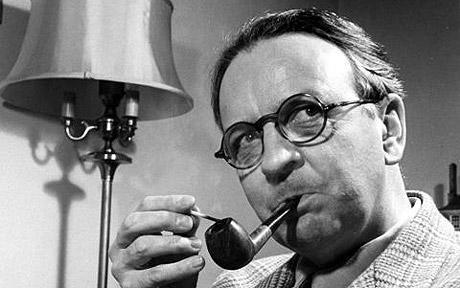
Whenever I start writing a new book, I re-read some Raymond Chandler. The books I write don't turn out much like Chandler in the end. But I repeat this process because his writing sparks me creatively. Every writer should have an author whose work does this for him. Here's how it works for me.
Not long ago I picked The Long Goodbye off the shelf, because it’s my favorite. From the very first page, where Marlowe finds Terry Lennox falling drunk out of a Rolls Royce Silver Wraith in front of a club called The Dancers, I find myself hooked once again:
“The girl gave him a look which ought to have stuck at least four inches out of his back. It didn’t bother him enough to give him the shakes.”
One day I may write something that good. While I'm waiting, I recline with Chandler and my little orange notebook, reading one of his concrete images -- and an image of my own springs into my head. The image that comes to me is nothing like Chandler's, but I know it appeared because I was reading Chandler. It doesn't happen with other writers. Not even Hammett.
There are characteristics of a work of art that work on us indefinably and subconciously. Take Mozart, about whom I wrote my historical thriller Mozart's Last Aria. Numerous studies have shown that his music can effect the brain. It helps ADD kids concentrate in class. It prevents epileptic seizures. But the same thing's untrue of, say, Beethoven. Some quality in Mozart's music has a unique effect on the brain.
Every one of us has a writer out there who can provide the Mozartean music to our creativity. For me it's Chandler. You have to find yours by trial and error.
Along with Hammett, Chandler did everything for American literature that people always assume Hemingway did: made things simple, direct, tough and stark. But unlike Hemingway (and like Hammett), Chandler had the gruff sense of humor of a man who didn’t buy into the system. He wasn’t a Communist like Hammett, but he’d lived in England and been in the Canadian airforce, and he'd been around a while before he started writing.
That’s why he wrote crime novels. It’s an outsider’s genre, the writing venue of a man or woman who sees through things and yet remains positive enough to bother putting pen to paper.
Chandler, like Marlowe, seems to have “felt as out of place as a cocktail onion on a banana split.” Frequently, so have I, when I’ve been among the corporate or the gilded of this world –– and I have spent many an uncomfortable day, month or year in those scurrilous circles. That, in fact, may be why I’m a writer. Certainly it helps me cope with the weird status a writer holds today, threatened and undervalued, and yet cherished (though not always enough for someone to buy your book and pay for your
kids to go to college.)
Which writer will you find to do this for you? Who's going to worm his/her way into your brain and open the creative stream?
Related articles across the web
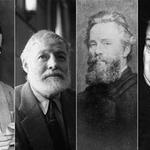 Authors' Favorite First Lines of Books
Authors' Favorite First Lines of Books
 Ellroy and Hammett: The Tory and the Communist
Ellroy and Hammett: The Tory and the Communist
 The myth of the drinking writer
The myth of the drinking writer
 Raymond Chandler: The Master of Nasty
Raymond Chandler: The Master of Nasty
 Who is the greatest American novelist? 1: Saul Bellow v Raymond Chandler
Who is the greatest American novelist? 1: Saul Bellow v Raymond Chandler

Whenever I start writing a new book, I re-read some Raymond Chandler. The books I write don't turn out much like Chandler in the end. But I repeat this process because his writing sparks me creatively. Every writer should have an author whose work does this for him. Here's how it works for me.
Not long ago I picked The Long Goodbye off the shelf, because it’s my favorite. From the very first page, where Marlowe finds Terry Lennox falling drunk out of a Rolls Royce Silver Wraith in front of a club called The Dancers, I find myself hooked once again:
“The girl gave him a look which ought to have stuck at least four inches out of his back. It didn’t bother him enough to give him the shakes.”
One day I may write something that good. While I'm waiting, I recline with Chandler and my little orange notebook, reading one of his concrete images -- and an image of my own springs into my head. The image that comes to me is nothing like Chandler's, but I know it appeared because I was reading Chandler. It doesn't happen with other writers. Not even Hammett.
There are characteristics of a work of art that work on us indefinably and subconciously. Take Mozart, about whom I wrote my historical thriller Mozart's Last Aria. Numerous studies have shown that his music can effect the brain. It helps ADD kids concentrate in class. It prevents epileptic seizures. But the same thing's untrue of, say, Beethoven. Some quality in Mozart's music has a unique effect on the brain.
Every one of us has a writer out there who can provide the Mozartean music to our creativity. For me it's Chandler. You have to find yours by trial and error.
Along with Hammett, Chandler did everything for American literature that people always assume Hemingway did: made things simple, direct, tough and stark. But unlike Hemingway (and like Hammett), Chandler had the gruff sense of humor of a man who didn’t buy into the system. He wasn’t a Communist like Hammett, but he’d lived in England and been in the Canadian airforce, and he'd been around a while before he started writing.
That’s why he wrote crime novels. It’s an outsider’s genre, the writing venue of a man or woman who sees through things and yet remains positive enough to bother putting pen to paper.
Chandler, like Marlowe, seems to have “felt as out of place as a cocktail onion on a banana split.” Frequently, so have I, when I’ve been among the corporate or the gilded of this world –– and I have spent many an uncomfortable day, month or year in those scurrilous circles. That, in fact, may be why I’m a writer. Certainly it helps me cope with the weird status a writer holds today, threatened and undervalued, and yet cherished (though not always enough for someone to buy your book and pay for your
kids to go to college.)
Which writer will you find to do this for you? Who's going to worm his/her way into your brain and open the creative stream?
Related articles across the web
 Authors' Favorite First Lines of Books
Authors' Favorite First Lines of Books  Ellroy and Hammett: The Tory and the Communist
Ellroy and Hammett: The Tory and the Communist  The myth of the drinking writer
The myth of the drinking writer  Raymond Chandler: The Master of Nasty
Raymond Chandler: The Master of Nasty  Who is the greatest American novelist? 1: Saul Bellow v Raymond Chandler
Who is the greatest American novelist? 1: Saul Bellow v Raymond Chandler
Published on February 05, 2014 04:35
•
Tags:
crime-fiction, raymond-chandler, writing, writing-tips
January 29, 2014
Great new thriller DEAD EVERY DAY Episode 1 out today
A great new thriller out today in episode form:
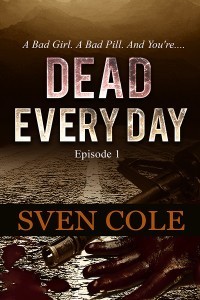
The shocking first episode of DEAD EVERY DAY: An Ellis Callan Thriller is out now. Download the US edition or get the UK edition
or get the UK edition .
.
Military historian Ellis Callan heads out on patrol in Baghdad to gather material for his oral history of the war in Iraq. The patrol goes badly wrong. Callan is left with guilt for the comrades and civilians he believes he should've saved. He turns to his sister, a psychiatrist. He takes an experimental pill for post-traumatic stress disorder. Then things get weird...
The second and third episodes of the novel will be out weekly.

The shocking first episode of DEAD EVERY DAY: An Ellis Callan Thriller is out now. Download the US edition
Military historian Ellis Callan heads out on patrol in Baghdad to gather material for his oral history of the war in Iraq. The patrol goes badly wrong. Callan is left with guilt for the comrades and civilians he believes he should've saved. He turns to his sister, a psychiatrist. He takes an experimental pill for post-traumatic stress disorder. Then things get weird...
The second and third episodes of the novel will be out weekly.
Published on January 29, 2014 01:24
•
Tags:
baghdad, iraq, military-thriller, new-release, new-york, psychological-thriller, ptsd, suspense, thriller
January 23, 2014
E is for erotica: How Emma Lauren wrote the year's sexiest romance ebook
A guest post from the author of a titillating new romance
 Here’s a guest post from Emma Lauren, author of
When It’s Love
, the steamiest novel you have to read this year –– because it’s also very well written. (You’ll discover that when you go back over it. See, I assume you’ll skim for the saucy parts first.) Here’s Emma’s account:
Here’s a guest post from Emma Lauren, author of
When It’s Love
, the steamiest novel you have to read this year –– because it’s also very well written. (You’ll discover that when you go back over it. See, I assume you’ll skim for the saucy parts first.) Here’s Emma’s account:
After a decade or so of writing some serious journalism and what I hope was literature, I wrote an erotic novel. It wasn’t something I’d dreamed of doing all my life. It wasn’t something I put a lot of thought into. I just imagined a sexy story, and I wrote it. I showed it to a couple of friends, and they told me it was definitely hot. My husband agreed. A few weeks later, I had a new identity, a book cover and I self published When It’s Love, an Illicit Contemporary Romance.
Why did I need a new identity?
At first I thought I needed a pen name because writing smut could harm my credibility in my day job, possibly offend some colleagues, and if my kids found out… it would embarrass the heck out of them. As I prepared to launch my book, however, I realized that the most important reason to have a pen name was so I could unabashedly push my book. The real me would never have the nerve to tell people to “read some really hot sex scenes I wrote.” But Emma is proud of that. She wants to tell people to go look at the amazing reviews her book is getting on Amazon. Here she is now telling you that one reader compared her to Stephen King, and another one warned readers to “make sure your hubby or boyfriend is around for a fun night after.”
When you self-publish, you’re an author and a marketer. If you’re not pushing your book, it ain’t happening. I’ve told only a few trusted friends about the book, and asked them to spread the word. On the whole, they’re impressed with my endeavor into a new genre, but the question they ask isn’t why did you write the book, or what’s it about. They want to know why I chose the name Emma Lauren.
There was a process. It began, obviously, at the dinner table with my children. Out of the blue, I asked them, “If you could have a different name, what would it be?” Naturally, before naming themselves anything, they named each other fartface, butthead, and caca. Then things got more serious. First they took Russian names upon themselves…They suggested Olga for me, a name I feared would not help sell in erotica. We went through French names, German names, names with thick guttural sounds… but what I really wanted was a classic all-American name that was just like every other name, yet memorable.
Although my book contains plenty of explicit sex, I didn’t want a name that suggested such things. (Therefore, I didn’t go with Pussy Hotlips.) I felt like the author of When It’s Love should have an elegant name, because the book isn’t only sex. It’s also a romance. There is something about the name Emma that is both soft and strong at the same time, romantic, but not cheesy. Once I’d thought of Emma, settling on it was easy.
Surnames were slightly harder. I Googled Emma + tons of surnames, to find one that wasn’t the name of a horrid criminal, another author in the same genre, or overly common. I almost went with Emma Avery because I liked the sound of it. But then Lauren popped into my mind. When I said the Emma and Lauren together, I knew it was right.
Now I leave it to you to imagine what Emma looks like....
 Here’s a guest post from Emma Lauren, author of
When It’s Love
, the steamiest novel you have to read this year –– because it’s also very well written. (You’ll discover that when you go back over it. See, I assume you’ll skim for the saucy parts first.) Here’s Emma’s account:
Here’s a guest post from Emma Lauren, author of
When It’s Love
, the steamiest novel you have to read this year –– because it’s also very well written. (You’ll discover that when you go back over it. See, I assume you’ll skim for the saucy parts first.) Here’s Emma’s account:After a decade or so of writing some serious journalism and what I hope was literature, I wrote an erotic novel. It wasn’t something I’d dreamed of doing all my life. It wasn’t something I put a lot of thought into. I just imagined a sexy story, and I wrote it. I showed it to a couple of friends, and they told me it was definitely hot. My husband agreed. A few weeks later, I had a new identity, a book cover and I self published When It’s Love, an Illicit Contemporary Romance.
Why did I need a new identity?
At first I thought I needed a pen name because writing smut could harm my credibility in my day job, possibly offend some colleagues, and if my kids found out… it would embarrass the heck out of them. As I prepared to launch my book, however, I realized that the most important reason to have a pen name was so I could unabashedly push my book. The real me would never have the nerve to tell people to “read some really hot sex scenes I wrote.” But Emma is proud of that. She wants to tell people to go look at the amazing reviews her book is getting on Amazon. Here she is now telling you that one reader compared her to Stephen King, and another one warned readers to “make sure your hubby or boyfriend is around for a fun night after.”
When you self-publish, you’re an author and a marketer. If you’re not pushing your book, it ain’t happening. I’ve told only a few trusted friends about the book, and asked them to spread the word. On the whole, they’re impressed with my endeavor into a new genre, but the question they ask isn’t why did you write the book, or what’s it about. They want to know why I chose the name Emma Lauren.
There was a process. It began, obviously, at the dinner table with my children. Out of the blue, I asked them, “If you could have a different name, what would it be?” Naturally, before naming themselves anything, they named each other fartface, butthead, and caca. Then things got more serious. First they took Russian names upon themselves…They suggested Olga for me, a name I feared would not help sell in erotica. We went through French names, German names, names with thick guttural sounds… but what I really wanted was a classic all-American name that was just like every other name, yet memorable.
Although my book contains plenty of explicit sex, I didn’t want a name that suggested such things. (Therefore, I didn’t go with Pussy Hotlips.) I felt like the author of When It’s Love should have an elegant name, because the book isn’t only sex. It’s also a romance. There is something about the name Emma that is both soft and strong at the same time, romantic, but not cheesy. Once I’d thought of Emma, settling on it was easy.
Surnames were slightly harder. I Googled Emma + tons of surnames, to find one that wasn’t the name of a horrid criminal, another author in the same genre, or overly common. I almost went with Emma Avery because I liked the sound of it. But then Lauren popped into my mind. When I said the Emma and Lauren together, I knew it was right.
Now I leave it to you to imagine what Emma looks like....
Published on January 23, 2014 04:08
•
Tags:
ebooks, emma-lauren, erotic-novel, erotica, romance
November 7, 2013
Arafat murdered with polonium, Swiss report
Net closes around Palestinian president's killers
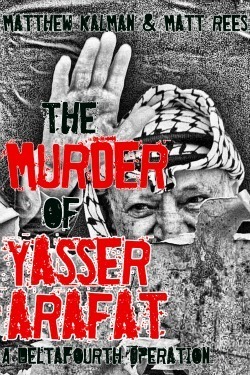 It's 11 months since I published The Murder of Yasser Arafat with co-author Matthew Kalman. We reported that Palestinian leaders in the immediate circle of the president had fed him poison, leading to his death nine years ago next Monday.
It's 11 months since I published The Murder of Yasser Arafat with co-author Matthew Kalman. We reported that Palestinian leaders in the immediate circle of the president had fed him poison, leading to his death nine years ago next Monday.
Swiss scientists reported this week that they had found unusually high levels of radioactive polonium in Arafat's exhumed bones. While some have tried to pooh-pooh the science behind the Swiss report, a leading UK nuclear physicist told the BBC that he agreed with the Swiss statement. In particular he cited the Swiss assessment that they'd give a "5 out of 6" chance Arafat died of polonium poisoning.
If you want to find out what really happened to Arafat, you could wait around for the leaders of the Palestinian Authority to clear it all up.....(I couldn't find the infinity symbol on my keyboard...) Or you could download our ebook and read the truth.
 It's 11 months since I published The Murder of Yasser Arafat with co-author Matthew Kalman. We reported that Palestinian leaders in the immediate circle of the president had fed him poison, leading to his death nine years ago next Monday.
It's 11 months since I published The Murder of Yasser Arafat with co-author Matthew Kalman. We reported that Palestinian leaders in the immediate circle of the president had fed him poison, leading to his death nine years ago next Monday.Swiss scientists reported this week that they had found unusually high levels of radioactive polonium in Arafat's exhumed bones. While some have tried to pooh-pooh the science behind the Swiss report, a leading UK nuclear physicist told the BBC that he agreed with the Swiss statement. In particular he cited the Swiss assessment that they'd give a "5 out of 6" chance Arafat died of polonium poisoning.
If you want to find out what really happened to Arafat, you could wait around for the leaders of the Palestinian Authority to clear it all up.....(I couldn't find the infinity symbol on my keyboard...) Or you could download our ebook and read the truth.
Published on November 07, 2013 11:00
•
Tags:
arafat, israel, middle-east, nonfiction, palestinian, palestinians, politics, the-murder-of-yasser-arafat
October 24, 2013
Pizza Bomber: shocking FBI case that reads like thriller
Exciting true crime from a top FBI investigator

Jerry Clark is a retired FBI Special Agent who now teaches at Gannon University in Pennsylvania. He was lead investigator on one of the most fascinating FBI cases of recent years. A case which became known as "the Pizza Bomber." With local investigative reporter Ed Palattella, Jerry wrote an account of his biggest case that at once lays out the intricacies of FBI investigative process and reads like a thriller. I asked Jerry to introduce Pizza Bomber: The Untold Story of America's Most Shocking Bank Robbery:
The crime was like none the FBI had ever witnessed. On August 28, 2003, in the suburbs of Erie, Pennsylvania, a pizza deliveryman named Brian Wells had a bomb locked to his neck and was sent off to rob a bank. After taking the money, Wells was supposed to go on a scavenger hunt to collect clues that would allow him to disarm the bomb.
The plot did not go according to plan.
The police stopped Wells shortly after he left the bank, and he never found the clues he needed to survive. The bomb exploded as he sat in front of a squad car, pleading for his life while providing few clues about his assailants. What followed was a bizarre trail of death, including the unexplained overdose of a second delivery driver from the same pizza shop, and a man's dead body found in a freezer inside a garage not far from where Wells made his final delivery.
 Questions surrounded the case as it unfolded. I asked many of those questions, as the lead FBI special agent on what the Bureau labelled Major Case #203 -- one of the only bank robbery investigations in the history of the FBI elevated to major case status.
Questions surrounded the case as it unfolded. I asked many of those questions, as the lead FBI special agent on what the Bureau labelled Major Case #203 -- one of the only bank robbery investigations in the history of the FBI elevated to major case status.
The public came to know it as the “pizza bomber” investigation.
Ten years after the death of Brian Wells, most of the questions can finally be answered. Wells, as my investigation determined, was both a participant and a victim in the diabolical plot, with greed driving the plan. The gang of highly intelligent misfits who built the bomb and locked it to Wells wanted to use the bank robbery proceeds to hire a hit man to kill the wealthy father of one of the conspirators. That way, the conspirator would inherit her father’s fortune.
I speak to law-enforcement groups and others about my experiences in the pizza bomber case, and about the book I co-wrote with Ed Palattella of the Erie Times-News. Many audience members ask if any part of the book is fiction. I remind them that, as weird as it was, the pizza bomber case was real.
And reality is never uncomplicated.

Jerry Clark is a retired FBI Special Agent who now teaches at Gannon University in Pennsylvania. He was lead investigator on one of the most fascinating FBI cases of recent years. A case which became known as "the Pizza Bomber." With local investigative reporter Ed Palattella, Jerry wrote an account of his biggest case that at once lays out the intricacies of FBI investigative process and reads like a thriller. I asked Jerry to introduce Pizza Bomber: The Untold Story of America's Most Shocking Bank Robbery:
The crime was like none the FBI had ever witnessed. On August 28, 2003, in the suburbs of Erie, Pennsylvania, a pizza deliveryman named Brian Wells had a bomb locked to his neck and was sent off to rob a bank. After taking the money, Wells was supposed to go on a scavenger hunt to collect clues that would allow him to disarm the bomb.
The plot did not go according to plan.
The police stopped Wells shortly after he left the bank, and he never found the clues he needed to survive. The bomb exploded as he sat in front of a squad car, pleading for his life while providing few clues about his assailants. What followed was a bizarre trail of death, including the unexplained overdose of a second delivery driver from the same pizza shop, and a man's dead body found in a freezer inside a garage not far from where Wells made his final delivery.
 Questions surrounded the case as it unfolded. I asked many of those questions, as the lead FBI special agent on what the Bureau labelled Major Case #203 -- one of the only bank robbery investigations in the history of the FBI elevated to major case status.
Questions surrounded the case as it unfolded. I asked many of those questions, as the lead FBI special agent on what the Bureau labelled Major Case #203 -- one of the only bank robbery investigations in the history of the FBI elevated to major case status.The public came to know it as the “pizza bomber” investigation.
Ten years after the death of Brian Wells, most of the questions can finally be answered. Wells, as my investigation determined, was both a participant and a victim in the diabolical plot, with greed driving the plan. The gang of highly intelligent misfits who built the bomb and locked it to Wells wanted to use the bank robbery proceeds to hire a hit man to kill the wealthy father of one of the conspirators. That way, the conspirator would inherit her father’s fortune.
I speak to law-enforcement groups and others about my experiences in the pizza bomber case, and about the book I co-wrote with Ed Palattella of the Erie Times-News. Many audience members ask if any part of the book is fiction. I remind them that, as weird as it was, the pizza bomber case was real.
And reality is never uncomplicated.
Published on October 24, 2013 04:46
•
Tags:
crime-fiction, fbi, pennsylvania, true-crime
October 21, 2013
Arafat poison stories show need for new journalism
Journalism needs a new way to handle a world run by corrupt oligarchs, megacorporations and others who'll just lie through their teeth
 Along with my The Murder of Yasser Arafat co-author Matthew Kalman, I've written an op-ed for the Israeli newspaper Haaretz explaining why journalism isn't the best way to find out what's going on. The article's behind a paywall, but for the elite readers of this august blog there's always a way and this is it. Old-fashioned types can even buy the book.
Along with my The Murder of Yasser Arafat co-author Matthew Kalman, I've written an op-ed for the Israeli newspaper Haaretz explaining why journalism isn't the best way to find out what's going on. The article's behind a paywall, but for the elite readers of this august blog there's always a way and this is it. Old-fashioned types can even buy the book.
 Along with my The Murder of Yasser Arafat co-author Matthew Kalman, I've written an op-ed for the Israeli newspaper Haaretz explaining why journalism isn't the best way to find out what's going on. The article's behind a paywall, but for the elite readers of this august blog there's always a way and this is it. Old-fashioned types can even buy the book.
Along with my The Murder of Yasser Arafat co-author Matthew Kalman, I've written an op-ed for the Israeli newspaper Haaretz explaining why journalism isn't the best way to find out what's going on. The article's behind a paywall, but for the elite readers of this august blog there's always a way and this is it. Old-fashioned types can even buy the book.
Published on October 21, 2013 22:08
•
Tags:
arafat, ebook, israel, journalism, middle-east, palestinians, politics, the-murder-of-yasser-arafat
October 9, 2013
New Israeli thriller focuses on life beyond the conflict
The first English translation of Israel's top crime novelist

Liad Shoham has been the most successful Israeli crime writer for some years now. Lineup, the first of his books to appear in English, has just been published in the US. Liad guest posts here about how he came to write his novels.
Several years ago, I was studying for my master’s degree in law at the London School of Economics. A few days after the beginning of the term, we had a departmental cocktail party. The school dean went around the room from one student to the next asking each where he or she came from and what they intended to study. When I said I was Israeli, and before I had had a chance to tell the dean what fields interested me most, he gleefully announced that the school had an “excellent course on the laws of war”.
Later I had the opportunity to meet my London classmates and to tell them that I had started writing legal thrillers. I was expecting to elicit the reaction I got from my Israeli friends: what does a geek like you know about writing thrillers? But my non-Israeli friends (despite, I suspect, sharing the sentiment) were more surprised by the fact that this genre even exists in Israel.
Well, it does. It is true that when Israel was founded and fighting for its survival this type of fiction was considered too frivolous for words and accordingly there were few thriller writers. Even the ones who wrote thrillers tended to publish under pen names. But Israel is changing and maturing and our literature reflects this. As David Ben Gurion, Israel’s first prime minister, said: “We’ll be a country like all other countries only once we have Israeli thieves and Israeli prostitutes.” And if I may expand on that -- Israeli thrillers.
One can certainly learn a great deal about Israel by listening to the international news and by reading novels dealing with the Arab Israeli conflict. But this will probably create a skewed view of the country, as anyone who has sampled Tel Aviv’s nightlife can attest. One might learn a great deal by exploring Israel’s daily life and crime fiction is a great place to start as it deals with the discovery of the truth, portrays how the police, the judicial system, the media and criminals operate and especially how do they operate under pressure.
Lineup is my fifth thriller. The story occurs in Israel. However, the plot could have taken place in almost any other Western democracy. Yet, I feel that Lineup is also a very Israeli story.
First and foremost, the characters demonstrate a tendency toward improvisation and a rather lax attitude towards process and decorum. Lineup is told by several people. Each narrator provides his or her own worldview. Everyone tries to do what they feel is right, even if what is “right” doesn’t follow the rules. They tend to go light on long-term planning, and rather improvise their way from one problem to the next. In a young country that needs to cope with a dynamically changing reality, improvisation is an integral part of life. I think that the book was also influenced to a great extent by the fact that the storyline occurs in a small place, in terms of geographical size and population. There’s nowhere to run away to, everyone potentially knows everyone else, and there will be constant meddling in your business. This same overcrowding creates involvement and a lot of family influence. Oh, yeah, it’s also very hot here in the summer.
A decade has passed since my days as a student in London and I don’t know what the dean is now saying to Israeli students. I hope that we, the Israelis as well as the Arabs, are able to create a narrative that is not only about the conflict and the laws of war. Lineup is my small contribution to this.

Liad Shoham has been the most successful Israeli crime writer for some years now. Lineup, the first of his books to appear in English, has just been published in the US. Liad guest posts here about how he came to write his novels.
Several years ago, I was studying for my master’s degree in law at the London School of Economics. A few days after the beginning of the term, we had a departmental cocktail party. The school dean went around the room from one student to the next asking each where he or she came from and what they intended to study. When I said I was Israeli, and before I had had a chance to tell the dean what fields interested me most, he gleefully announced that the school had an “excellent course on the laws of war”.
Later I had the opportunity to meet my London classmates and to tell them that I had started writing legal thrillers. I was expecting to elicit the reaction I got from my Israeli friends: what does a geek like you know about writing thrillers? But my non-Israeli friends (despite, I suspect, sharing the sentiment) were more surprised by the fact that this genre even exists in Israel.
Well, it does. It is true that when Israel was founded and fighting for its survival this type of fiction was considered too frivolous for words and accordingly there were few thriller writers. Even the ones who wrote thrillers tended to publish under pen names. But Israel is changing and maturing and our literature reflects this. As David Ben Gurion, Israel’s first prime minister, said: “We’ll be a country like all other countries only once we have Israeli thieves and Israeli prostitutes.” And if I may expand on that -- Israeli thrillers.
One can certainly learn a great deal about Israel by listening to the international news and by reading novels dealing with the Arab Israeli conflict. But this will probably create a skewed view of the country, as anyone who has sampled Tel Aviv’s nightlife can attest. One might learn a great deal by exploring Israel’s daily life and crime fiction is a great place to start as it deals with the discovery of the truth, portrays how the police, the judicial system, the media and criminals operate and especially how do they operate under pressure.
Lineup is my fifth thriller. The story occurs in Israel. However, the plot could have taken place in almost any other Western democracy. Yet, I feel that Lineup is also a very Israeli story.
First and foremost, the characters demonstrate a tendency toward improvisation and a rather lax attitude towards process and decorum. Lineup is told by several people. Each narrator provides his or her own worldview. Everyone tries to do what they feel is right, even if what is “right” doesn’t follow the rules. They tend to go light on long-term planning, and rather improvise their way from one problem to the next. In a young country that needs to cope with a dynamically changing reality, improvisation is an integral part of life. I think that the book was also influenced to a great extent by the fact that the storyline occurs in a small place, in terms of geographical size and population. There’s nowhere to run away to, everyone potentially knows everyone else, and there will be constant meddling in your business. This same overcrowding creates involvement and a lot of family influence. Oh, yeah, it’s also very hot here in the summer.
A decade has passed since my days as a student in London and I don’t know what the dean is now saying to Israeli students. I hope that we, the Israelis as well as the Arabs, are able to create a narrative that is not only about the conflict and the laws of war. Lineup is my small contribution to this.
Published on October 09, 2013 01:46
•
Tags:
biography, diplomacy, israel, jewish-history, liad-shoham, middle-east, netanyahu, politics, thriller
October 3, 2013
My chat with Tom Clancy
Master of techno twists and turns dead. Or is he?
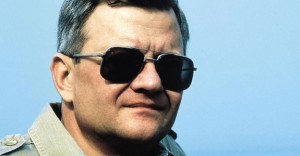
It's hard to imagine that Tom Clancy, who died this week, was only 66. He had been at the top of the thriller game for so long. The Hunt for Red October was published almost 30 years ago.
The time I met Clancy was longer ago than I'd care to acknowledge, too. I was a reporter for Forbes magazine. It was 1992, and as is the wont of that magazine of Mammon I was preparing an article about the biggest earners in various fields. That sent me off to chat about Wall Street with Christie Turlington (who giggled a lot) and Michael DeBakey, the heart transplant pioneer (who didn't giggle at all.)
I also found myself face to face with Clancy, sucking in some second-hand smoke and staring at his smoky-dark Aviators.
He was terrific.
"When my friends tell me they've made a killing on the Street, they're not talking about Wall Street," he said. "They really mean it."
Plenty of people who haven't read a Clancy novel understood what others meant when they said the 9/11 plot was "like something out of a Tom Clancy novel." Now that the obits sum up his achievements, I detect the usual undertone of "well, he was ONLY a thriller writer." I'm here to tell you that he was much more than that.
Clancy did seem to have amazing information from within the "military-industrial complex." But the overriding sense I had of him was that he was playing a role, much in the way that James Ellroy plays a misanthropic hardboiled gumshoe (when really he just likes to sit in the dark and listen to Beethoven symphonies.)
Unlike Ellroy (by my estimation), Clancy enjoyed his act. He had tapped into the military hardware nerd hidden deep inside himself and turned that guy into a money-making (thrill-making) machine, all with a typewriter (it was a long time ago, as I said) and a pair of polarized lenses. The Clancy-industrial complex includes video games and "co-written" novels that, according to Forbes, earn him upwards of $35 million a year.
So I'm sorry to lose him. Because anyone who has fun writing and talking about writing is a big success, no matter how much money they do or don't make.

It's hard to imagine that Tom Clancy, who died this week, was only 66. He had been at the top of the thriller game for so long. The Hunt for Red October was published almost 30 years ago.
The time I met Clancy was longer ago than I'd care to acknowledge, too. I was a reporter for Forbes magazine. It was 1992, and as is the wont of that magazine of Mammon I was preparing an article about the biggest earners in various fields. That sent me off to chat about Wall Street with Christie Turlington (who giggled a lot) and Michael DeBakey, the heart transplant pioneer (who didn't giggle at all.)
I also found myself face to face with Clancy, sucking in some second-hand smoke and staring at his smoky-dark Aviators.
He was terrific.
"When my friends tell me they've made a killing on the Street, they're not talking about Wall Street," he said. "They really mean it."
Plenty of people who haven't read a Clancy novel understood what others meant when they said the 9/11 plot was "like something out of a Tom Clancy novel." Now that the obits sum up his achievements, I detect the usual undertone of "well, he was ONLY a thriller writer." I'm here to tell you that he was much more than that.
Clancy did seem to have amazing information from within the "military-industrial complex." But the overriding sense I had of him was that he was playing a role, much in the way that James Ellroy plays a misanthropic hardboiled gumshoe (when really he just likes to sit in the dark and listen to Beethoven symphonies.)
Unlike Ellroy (by my estimation), Clancy enjoyed his act. He had tapped into the military hardware nerd hidden deep inside himself and turned that guy into a money-making (thrill-making) machine, all with a typewriter (it was a long time ago, as I said) and a pair of polarized lenses. The Clancy-industrial complex includes video games and "co-written" novels that, according to Forbes, earn him upwards of $35 million a year.
So I'm sorry to lose him. Because anyone who has fun writing and talking about writing is a big success, no matter how much money they do or don't make.
Published on October 03, 2013 04:04
•
Tags:
crime-fiction, techno-thriller, thriller, tom-clancy, tom-clancy-obituary



